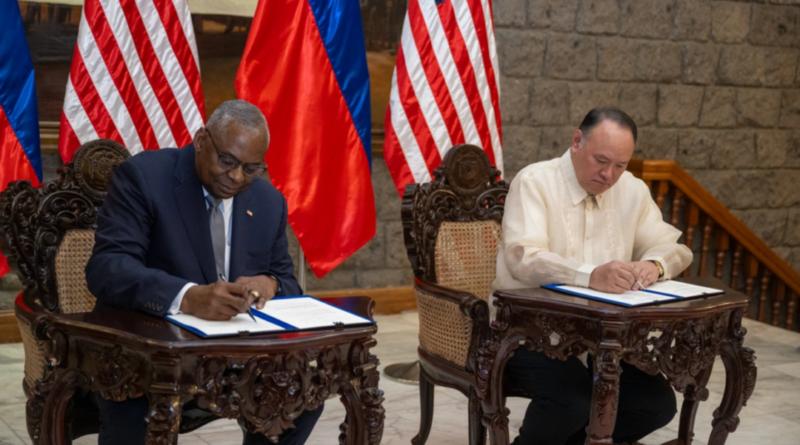The United States and the Philippines have entered into a new military cooperation agreement aimed at enhancing intelligence-sharing and enabling Manila to access more advanced U.S. weapons systems.
Defense Secretary Lloyd Austin and Philippine Defense Minister Gilberto Teodoro
signed the General Security of Military Information Agreement (GSOMIA) at a ceremony held at the Camp Aguinaldo military base in Manila on November 18.
This agreement permits the United States to share crucial military information, including details necessary for operating advanced weapons like missile systems.
Philippine Defense Ministry spokesperson Arsenio Andolong stated, “Not only will this allow the Philippines access to higher capabilities and big-ticket items from the United States, it will also open opportunities to pursue similar agreements with like-minded nations.”
Past attempts by the Philippines to procure sophisticated weapons from the U.S. military were hindered by the absence of such an intelligence-sharing agreement.
This deficiency left Philippine forces in a difficult situation in 2017 when they had to find ways to combat ISIS jihadist affiliates who had established a presence in the southern city of Marawi.
Related Stories
Throughout the year, Manila raised concerns as
Chinese coast guard ships attempted to obstruct the Philippine military from supplying personnel stationed at the BRP Sierra Madre—an intentionally grounded vessel by the Philippine navy at the Second Thomas Shoal in 1999 to reinforce the country’s territorial claim over the disputed reef.
The U.S.-Philippine alliance could play a vital role in deterring China’s expansionist endeavors in the South China Sea and the wider Indo-Pacific region.
Austin and Teodoro participated in a groundbreaking ceremony for a new center on Camp Aguinaldo to facilitate future joint operations between the U.S. and Philippine militaries.
During the signing event, Teodoro also
awarded Austin with the Philippine military’s Outstanding Achievement Medal, in recognition of his significant contributions to strengthening bilateral defense ties and promoting regional security in the Indo-Pacific region since assuming office in 2021.
In response to the new U.S.-Philippine military cooperation agreement, Chinese Foreign Ministry spokesperson Lin Jian
stressed that any military agreements or security cooperation should not target or harm the interests of a third party and should not jeopardize regional peace or exacerbate tensions.
“The best approach to safeguarding national security and regional peace and stability is to uphold good neighborliness, friendship, and maintain strategic independence,” the Chinese spokesperson added.
Reuters and The Associated Press contributed to this report.
Source link


